The 20 Best Hair Growth Vitamins, According to Experts and Editors
Yes, they actually work.
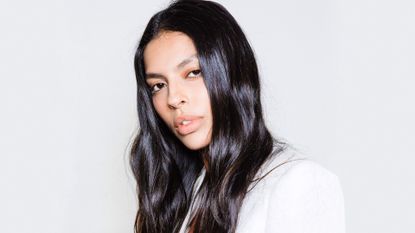

While investing in hair growth shampoos, oils, and other top-notch topical hair growth products can go a long way in supporting scalp health and growing your hair, the best hair growth vitamins can give you an extra boost. According to trichologist Anabel Kingsley, roughly 90 percent of her patients experience hair loss due to nutritional deficiencies. Of course, supplements are, per their name, supplemental, so they only work if compensating for an existent deficiency. While you'll always want to get blood work and consult with a board-certified physician if you're experiencing severe hair loss, adding a vitamin to your diet can help stop shedding and kickstart growth.
To better understand how hair growth vitamins can fit into your self-care regimen, we asked dermatologists and trichologists how hair growth vitamins can work, the ingredients to look out for, and the products they recommend. Ahead, the best, most effective options on the market.
What To Look For in a Hair Growth Vitamin
- Reputation
The supplement industry is a controversial one, being that it's not regulated by the Food and Drug Administration (FDA), but there are plenty of well-respected vitamin manufacturers that consult with doctors, trichologists, and board-certified dermatologists to turn out safe and efficacious gummies or supplements. Before adding a supplement to your routine, consult with your doctor. Kim Nichols, M.D., F.A.A.D., and board-certified dermatologist also recommends seeing if there are any clinical trials available for the options you're considering. She says, "Purchase products that are backed by science—meaning they are shown to be clinically effective."
- Ingredients
Dr. Nichols also says that the key to a good hair growth supplement is "clinically effective, medical-grade ingredients." But which ingredients are best for hair growth, and what does each one do? We break it down:
Collagen is a popular form of protein touted for its hair and skin benefits because hair strands are almost entirely comprised of protein (specifically keratin). Therefore, if you're deficient in protein, Kingsley says that when you add a collagen supplement to your diet, "it can be deduced that it plays a role in scalp health and hair health." However, she notes that peer-reviewed studies have come to mixed conclusions on whether collagen truly promotes hair growth. Furthermore, Peter Young, M.D., and board-certified dermatologist points out that collagen is not suitable for vegetarians or vegans, as it comes from cows, pigs, or fish.
Biotin is a form of Vitamin B that comes highly recommended by Dr. Nichols and is another popular ingredient in most hair growth vitamins. Naana Boakye, M.D., a board-certified dermatologist and founder of Bergen Dermatology calls it "essential for hair strength, as it helps improve the keratin infrastructure, making hair stronger and more resilient." Candace Spann, M.D., and board-certified dermatologist adds that if you're deficient in biotin, you'll likely notice hair breakage and thinning.
If your hair feels especially dry or if you're struggling with breakage, look for a supplement with zinc. Dr. Spann says, "Zinc deficiency frequently presents with thinning hair and hair breakage." Dr. Boakye adds that zinc is crucial for hair repair and DNA stability.
B Vitamins, including Vitamins B6 and B12, support hair growth by promoting a better flow of red blood cells. This reinvigorates cells and promotes scalp health and, consequently, better hair growth. However, Dr. Boakye says that riboflavin, folate, biotin, and Vitamin B12 are the only forms of Vitamin B associated with hair growth.
Dr. Nichols also recommends Vitamin D, which has a direct relationship with hair follicles. To be more specific, Dr. Boakye says that a Vitamin D deficiency can cause hair thinning, so taking it as a supplement (if you're deficient) can "assist in developing new follicles."
Vitamin E is another must-have for Dr. Nichols. Dr. Boakye attests, "Vitamin E is an incredible antioxidant that lessens oxidative stress on the scalp leading to healthier hair growth, as it enhances scalp health and blood circulation."
If you have an iron deficiency, you may end up with conditions such as anemia or telogen effluvium, which can lead to hair loss. In fact, Dr. Spann says that hair thinning and breakage if often one of the first visible signs of an iron deficiency. According to Dr. Boakye, getting enough iron in "enables hemoglobin formation that transports oxygen toward scalps and follicles, resulting in stronger, denser strands of hair."
If you're taking an iron supplement, Dr. Spann recommends getting a full dose of Vitamin C in. "Vitamin C aids in iron absorption," she explains. Plus, Vitamin C naturally boosts collagen production, preventing deficiencies in collagen and protein that could result in hair loss. Dr. Nichols says to look for Vitamin C in an ideal hair growth vitamin.
Best Hair Growth Vitamins
- Best Overall Hair Growth Vitamin: Viviscal Extra Strength Hair Growth Supplements
- Best Hair Growth Vitamin for Hair Retention: Nutrafol Women Hair Growth Supplement for Thicker, Stronger Hair
- Best Vegan Hair Growth Vitamin: Vegamour Gro Biotin Gummies for Thinning Hair
- Best Hair Growth Vitamin for Breakage: Nioxin Density Defend Hair Growth Supplements
- Best Hair Growth Vitamin for Sensitive Stomachs: Philip Kingsley Density Discovery Collection
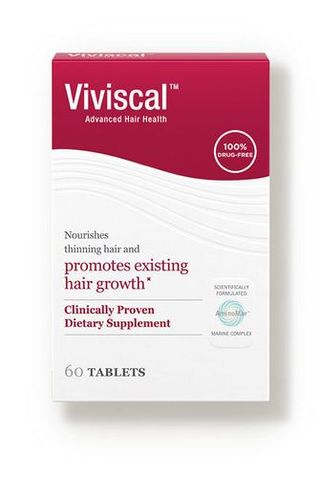
This supplement is beloved by hairstylists and celebrities (including Jen Aniston, the subject of hair envy everywhere) because it actually works. It's even been tested in a peer-reviewed study. These tablets are formulated with horsetail extract, fish protein, and vitamin C to strengthen strands, prevent split ends, and speed up the growth process. Visiscal is commonly recommended to balding women and former chemotherapy recipients for its ability to promote complete hair regrowth.
Key Ingredients: Vitamin C, Fish protein, Horsetail extract
How to Use It: One pill twice a day with water after meals
When to Expect Results: 90 to 180 days
Pros: Celebrity favorite; Helps strengthen existing hair; Clinically tested
Cons: Only work after consistent use for three to six months; Not vegan
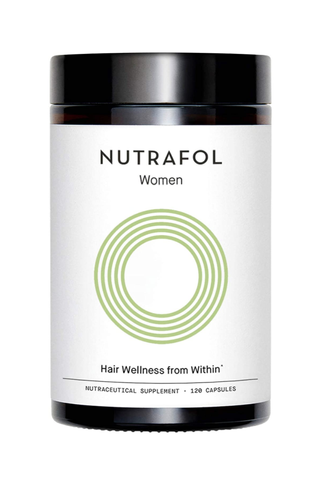
I've used Nutrafol on and off for years, and I've seen a difference in hair fall during times of consistent usage. Unlike other supplements, it also doesn't upset my stomach—although the regimen calls for four pills at a time, which sometimes feels like a lot. Dr. Nichols stands by the pills' results, too. "Nutrafol supplements target key factors of thinning hair such as nutrition, stress, and lifestyle with natural, medical grade ingredients," she shares. "This clinically effective supplement improves hair growth and visible thickness."
Key Ingredients: Marine collagen, Ashwagandha, Curcumin, Saw palmetto
How to Use It: Four pills once a day with water after a meal
When to Expect Results: Six months
Pros: Clinically-tested; Dermatologist-recommended; Editor-approved
Cons: Expensive; Only a 30-day supply; Several pills at once, which may feel overwhelming for some users
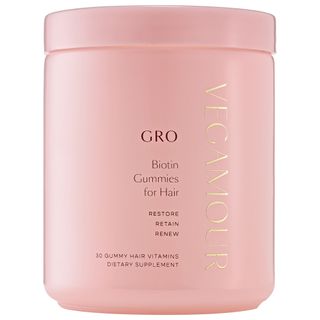
This one-month supply of gummies promises to thicken hair and abides by stringent cruelty-free, organic, vegan production standards. Reviews for this product are positively glowing, with customers stating reduced shedding and growth and no skin breakouts or stomach upsets. The formula features Vitamin C, which Dr. Nichols says supports blood flow to the scalp, and biotin and zinc, which she and Kingsley both recommend.
Key Ingredients: Vitamin C, Biotin, Zinc
How to Use It: Take one gummy per day on a full stomach
When to Expect Results: Three to four months
Pros: Vegan; Includes Vitamin C, biotin, and zinc; Cruelty-free; Gluten-free
Cons: Contains added sugar for taste
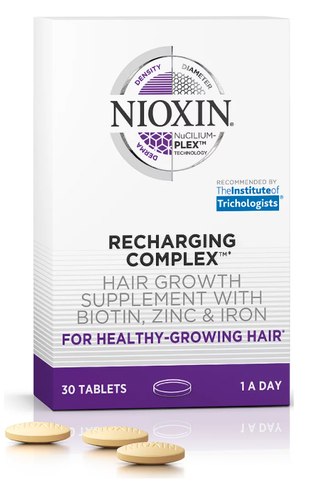
Nioxin is a dermatologist and trichologist favorite. The Recharging Complex Hair Growth Supplements—packed with biotin, zinc, and iron—do not disappoint when it comes to strengthening your hair from the inside out so you experience less breakage and fewer split ends. Zinc and iron, in particular, come highly recommended by Kingsley.
Key Ingredients: Iron, Zinc, Biotin
How to Use It: Take one pill per day on a full stomach
When to Expect Results: One to three months
Pros: Beloved by reviewers; Clinically tested
Cons: Some reviewers say it gave them acne
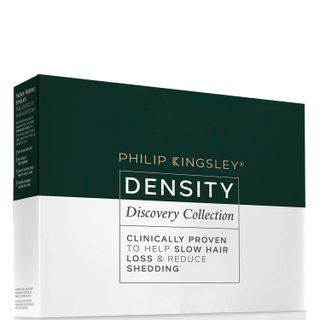
This supplement curbed my excessive post-Covid shedding almost immediately and helped me grow tons of promising new hairs all over my head. "It contains all the vitamins and minerals that are commonly deficient in patients at our Clinic," says Kingsley. However, she admits, "I will say, this does not contain zinc, so I suggest purchasing a separate zinc supplement if your level is low." Because it doesn't contain zinc, however, this option never upset my stomach.
Key Ingredients: Vitamin C, Biotin
How to Use It: Take one pill per day on a full stomach, ideally in the morning
When to Expect Results: Three to four months
Post: Trichologist-approved; Developed by a professional trichologist; Editor-approved
Cons: Expensive
Also Recommended
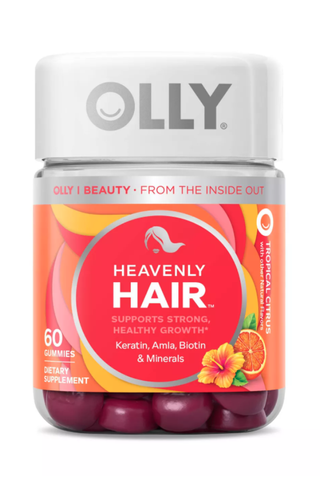
These tropical orange-flavored gummies work to strengthen the hair follicle for optimal growth and retention, as well as decreased breakage. Their key ingredients include biotin, which Dr. Nichols recommends. She says, "The most popular B vitamin, biotin, is a key player in promoting healthy hair growth. With biotin comes an increase in keratin production, which is the main component of your hair makeup." I've tried this supplement before and, while I don't usually like gummy vitamins, I find these easy to chew, fun to take, and gentle on my stomach, even when I have them first thing in the morning.
Key Ingredients: Amla, Biotin, Vitamin C, Keratin
How to Use It: Two per day in the morning
When to Expect Results: Two months
Pros: Gluten-free; Affordable; Reduces shedding; Editor-approved
Cons: Strong taste is polarizing; Gummies are sticky
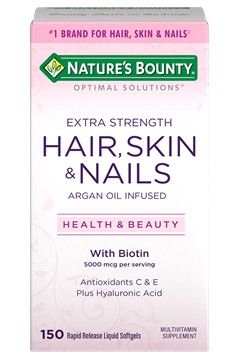
Like many of its competitors, NourishVita's hair growth supplement contains strand-friendly ingredients like biotin and Vitamin A, both of which are recommended by our experts. However, it also contains folic acid, which the CDC says helps new cell growth, including that of hair, skin, and nails.
Key Ingredients: Folic acid, Biotin, Vitamins A, C, and D
How to Use It: Take two pills per day with food
When to Expect Results: Some users report improvement in hair retention in only three weeks
Pros: Supports lash and brow growth; Free of gluten, parabens, pthalates, and sulfates; Cruelty-free; Halal-compliant
Cons: Expensive for only a 30-day supply
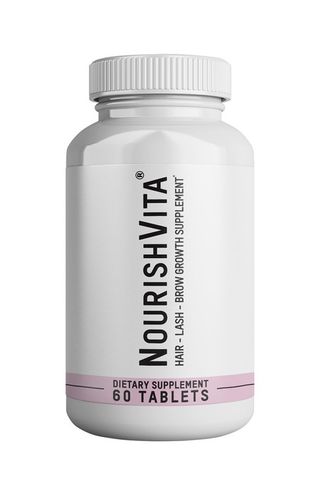
Like many of its competitors, NourishVita's hair growth supplement contains strand-friendly ingredients like biotin and Vitamin A, both of which are recommended by our experts. However, it also contains folic acid, which the CDC says helps new cell growth, including that of hair, skin, and nails.
Key Ingredients: Folic acid, Biotin, Vitamins A, C, and D,
How to Use It: Take two pills per day with food
When to Expect Results: 19 days
Pros: supports lash and brow growth; free of gluten, parabens, pthalates, and sulfates; cruelty-free
Cons: expensive for only a 30-day supply
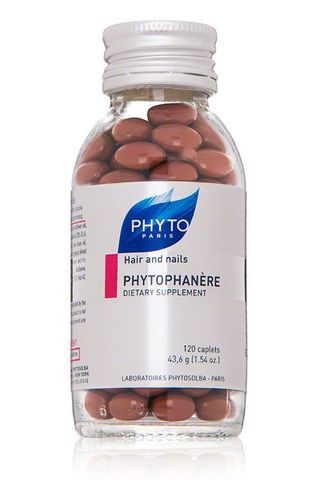
This high-potency supplement not only promotes healthier and shinier hair with a slew of fatty acids, vitamins, and antioxidants, but it also makes your nails stronger and promotes glowing skin. Reviewers say that the regimen is easy to follow and that after a few months of use, they noticed a difference in hair growth and thickness. The formula's key ingredient is biotin, but it also contains borage seed oil, which supports the production of keratin.
Key Ingredients: Vitamins B2, B5, B6, and E, Borage seed oil
How to Use It: Two pills per day with food
When to Expect Results: Four months
Pros: Includes a guided regimen on when to use and take a break; Large quantity
Cons: Expensive; Contains gelatin and fish oil, so not vegan; Contains soy and wheat, which some users may be allergic to
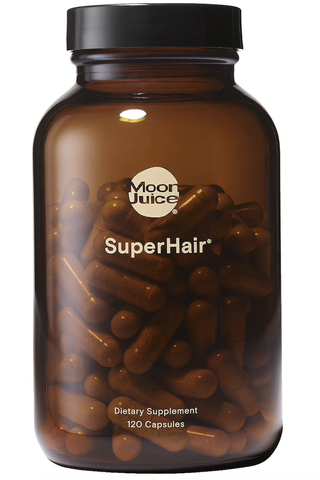
Unfortunately, hair loss and thinning are often a result of physical and psychological stress. While practices such as meditation, good diet and sleep, and exercise help with this, you can also turn to supplements such as this one to boost your nutrition. Reviewers, many of whom dealt with personal and health-related stressors, say that Moon Juice's formula bolstered their hair growth, decreased loss, and improved density.
Key Ingredients: Vitamins B, C, and E
How to Use It: Four per day with food
When to Expect Results: 90 days
Pros: fights stress-related hair loss; improves both fullness and length; cruelty-free; clean; gluten-free
Cons: large pills; aftertaste
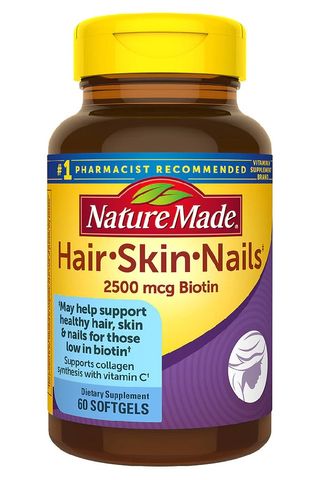
This drugstore favorite will keep your strands strong for two whole months at an unbeatable price. Plus, they're tiny, easy to swallow, and don't have an unpleasant aftertaste. Per its name, this formula contains biotin, but it also has other expert-approved ingredients like vitamin C, zinc, and vitamin A.
Key Ingredients: Biotin, Vitamins A and C, Zinc
How to Use It: One per day with food
When to Expect Results: Two months
Pros: Large quantity; Affordable; Easy to swallow; No aftertaste; Gluten-free
Cons: Not vegan (formula includes gelatin)

Because this formula hinges on keratin, the protein that makes up hair strands, it's great for shedding and breakage. It also protects hair and skin from the wear and tear of sun damage, heat treatment, and styling because it includes reservatrol, a clinically tested anti-inflammatory antioxidant.
Key Ingredients: Biotin, Reservatrol, Vitamin B6, Keratin
How to Use It: Two capsules daily with food
When to Expect Results: 90 days
Pros: Easy to swallow; No aftertaste; Combats hair thinning
Cons: Relatively expensive for size of supply; Not vegan (contains gelatin)
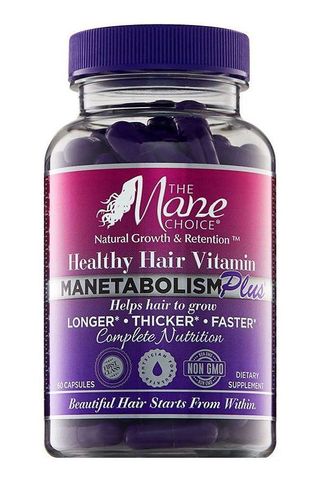
This multivitamin will help you reach your hair goals, and because it has vitamins A, D3, and E, you'll also benefit from an enhanced immune system. For best results, chew two gummies per day. Each bottle contains a one-month supply.
Key Ingredients: Biotin, Zinc, Vitamins A, C, and E
How to Use It: Two capsules per day
When to Expect Results: Three months
Pros: Helps overall health; Affordable
Cons: Not vegan
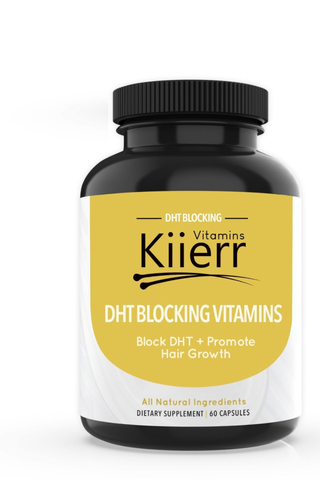
Dihydrotestosterone (DHT) is the hormone responsible for male pattern hair loss, and these vitamins work to block the proliferation of DHT in order to slow shedding and thinning. While the relationship between DHT and female pattern hair loss has not been studied as extensively, people of all genders still love these vitamins—including me.
Key Ingredients: Zinc, Folic acid, Vitamin B6
How to Use It: Two pills per day with food
When to Expect Results: 30-60 days
Pros: Editor-approved; Addresses hormonal causes of hair loss; contains zinc
Cons: Research on DHT in women is not as extensive as it is for men
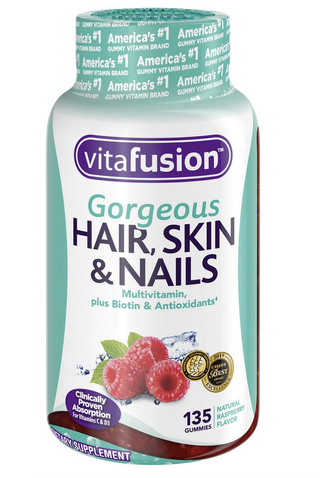
These vitamins contain 125 percent of one's daily value of vitamin D. Kingsley says that many of her patients struggle with vitamin D deficiency and stresses the importance of consuming this ingredient when growing out your hair. She says, "Every hair follicle contains a vitamin D receptor, so a deficiency can profoundly impact hair growth cycling."
Key Ingredients: Biotin, Vitamins D and E
How to Use It: Three gummies per day
When to Expect Results: Three months
Pros: Affordable; Large supply; Gluten-free; Large amount of vitamin D
Cons: Not vegan; Sweet taste may be polarizing
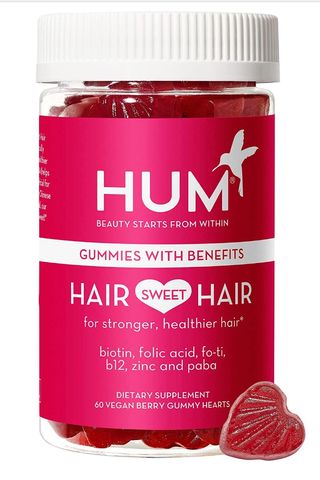
Hum is a big fan-favorite for its extensive line of supplements, including products that support muscle development, bolstered natural energy, and gut health. This option, in particular, incorporates biotin, zinc, Vitamin B12, folic acid—all of which support healthy hair growth and retention. Several reviewers note these gummies even made their hair feel softer, which come
Key Ingredients: Biotin, Zinc, Vitamin B12, Folic acid
How to Use It: Two gummies per day
When to Expect Results: Three months
Pros: Vegan; Gluten-free; Clean; Packed with expert-approved ingredients
Cons: Some users report an increase in breakouts
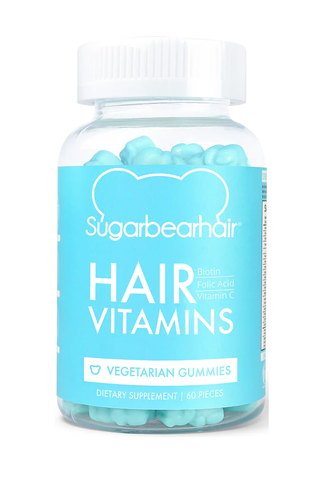
These little blue bears (which are gelatin- and gluten-free) are flavored with natural berries and infused with biotin, folic acid, and vitamin D to stimulate growth and promote healthy hair. Plus, users say that the formula is so delicious it's tempting to eat them like candy.
Key Ingredients: Biotin, Zinc, Vitamin D, Folic acid
How to Use It: One gummy per day
When to Expect Results: Three months
Pros: Celebrity-beloved; Great taste; Includes biotin; Easy to chew; Vegetarian
Cons: Expensive for the size of the supply
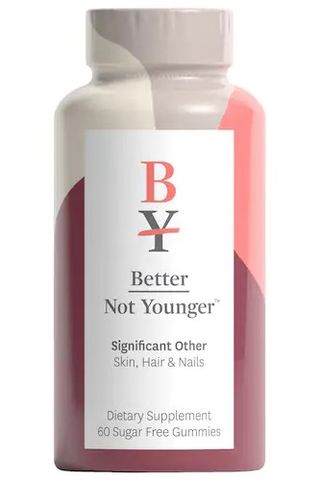
We love this choice for its promise to strengthen hair from your scalp to your ends, by incorporating vitamin A. However, reviewers warn users to start slowly if they're not accustomed to the effects of vitamin A or retinol, as skin purging (i.e., breakouts) can result upon use. Although they're gummies, these vitamins are sugar-free, so they're great for those looking to keep their sugar levels down.
Key Ingredients: Vitamins A and C, Biotin, Folate
How to Use It: Two gummies per day
When to Expect Results: One to two months
Pros: Free of sugar and nuts; Contains biotin; Great taste
Cons: Can cause breakouts (contains vitamin A)
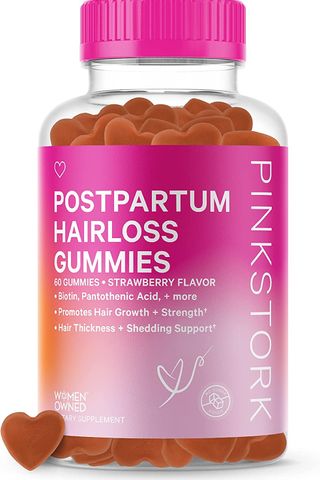
Postpartum hair loss is a common struggle that many mothers experience within the first three months after giving birth. To combat this, check with your OBGYN and consider adding a supplement like this one to your daily self-care routine. The popular formula contains ingredients like biotin, folate, vitamin B6, vitamin B12, and pantothenic acid so your hair can enjoy nourishment from the inside out. Customers are particularly pleased with how quickly the supplements work, with some saying that they saw results within six weeks.
Key Ingredients: Biotin, Folate, Vitamins B6 and B12, Panthothenic acid
How to Use It: Two gummies per day
When to Expect Results: Six weeks, but the brand recommends three months for best results
Pros: Woman-owned brand; Helps with post-partum hair loss; Quick results; Gluten-free; Non-GMO
Cons: Contains sugar
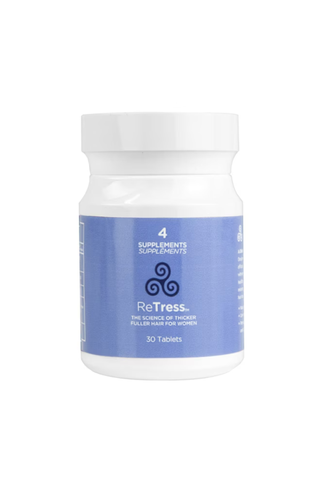
This option is from Dr. Spann's hair growth brand, Retress. She says that she specifically formulated the vitamins with biotin and zinc, explaining that these components go a long way in diminishing breakage and thinning as well as fostering new, healthy hair growth. One bottle contains a month's supply
Key Ingredients: Biotin, Zinc
How to Use It: One pill per day with food
When to Expect Results: Two to three months
Pros: Dermatologist-owned brand; Affordable
Cons: Need to repurchase the bottle more than once in order to see results
How to Use Hair Growth Vitamins
First and foremost, Dr. Nichols points out that every supplement has its own set of instructions, so you should follow the manufacturer's suggestions about how many pills to take per day and when to take them. And don't feel tempted to go beyond the serving size: Supplement brands carefully select their recommended dosages, and going beyond those recommendations can have adverse effects on your health, according to a study published in the International Journal of Environmental Research and Public Health.
In terms of when to take your vitamins, once again, check the guidance on your bottle. It's generally recommended that water-soluble vitamins (such as biotin) should be taken on an empty stomach for best absorption, whereas fat-soluble vitamins (such as Vitamins A, D, and E) should be taken on a full stomach. However, your hair growth vitamin of choice may contain a mixture of both these ingredients, so your best bet is to take it on a full stomach—especially if you're prone to side effects like nausea and gas.
Do Hair Growth Vitamins Work?
While hair growth vitamins can go a long way in filling any nutritional deficiencies adversely impacting your hair health, it's important to note that they're not cure-alls. Hydration, a healthy diet, exercise, and responsible haircare (like not heat-treating or over-bleaching your hair) are the primary keys to supporting hair growth and retention.
It's best, then, to see supplements as just that—supplemental. Dr. Nichols says, "Hair growth supplements work synergistically to strengthen your hair. Vitamin C, for instance, increases blood circulation to your scalp, stimulating your hair follicles and encouraging hair growth. And when your hair growth vitamin includes vitamin D, it is metabolized by cells in the epidermis that create keratin." These benefits, however, won't be reaped unless you're already leading a healthy lifestyle that supports healthy hair growth.
Safety Considerations
Supplements are not regulated by the FDA, but some are more rigorously tested than others. Still, even clinically tested supplements can cause side effects. "Hair growth supplements can potentially cause additional hair growth for someone with hormonal disorders that cause excessive growth in facial and body hair," says Dr. Nicols. Among the most common of these disorders is Polycystic Ovarian Syndrome (PCOS).
Some users also claim that hair growth vitamins cause their skin to "purge," or break out, more than usual. Dr. Nichols says, "There’s no solid evidence of hair growth supplements causing breakouts. Still, some vitamins don’t always work well with one another. For instance, too many B vitamins, such as biotin, can lead to skin dehydration, eventually leading to breakouts."
Finally, she mentions, "While we have no reason to believe they are unsafe, hair supplements are not usually tested in pregnant women."
Managing Expectations
Results from hair growth vitamins vary. First, as aforementioned, you should ensure that you're supporting your hair growth topically (by washing your hair and cleaning your scalp), eating a healthy, protein-rich diet, and hydrating sufficiently.
Your results also depend on what vitamin you're taking. While supplement manufacturers promise miraculous results from taking biotin, a peer-reviewed clinical study points out that biotin supplements only increase hair growth in individuals with diagnosed biotin deficiencies. Those individuals saw marked results anywhere between six weeks and six months, while those who weren't deficient in biotin saw no results at all. Meanwhile, a clinical study on Viviscal, which contains a litany of ingredients that address several potential causes of hair loss, yielded results in only 90 to 180 days.
Although the clinical results of these vitamins—along with the speed of those results—vary, the overall consensus is that you should take your supplements consistently for at least a month (at the very minimum!) to see any improvement.
Topical vs. Oral Treatments
As aforementioned, hair growth vitamins tackle hair loss, shedding, and decreased growth rates from within. However, hair growth is also impacted by external conditions such as the environment, your haircare routine, and scalp health. Therefore, you may need to address your hair growth issues through a scalp treatment or clarifying shampoo, either of which can make your scalp a cleaner, healthier environment for new growth. You may also want to turn to a topical treatment such as an oil or shampoo. Dr. Young, for instance, testifies that ingredients such as caffeine, biotin, and green tea can be used topically for better scalp health and, consequently, better hair growth. You can avail of these ingredients in one of the best hair growth shampoos and hair growth oils.
Still unsure of whether your issue should be addressed topically or orally? Contact your doctor or dermatologist, who can determine once and for all whether you're dealing with a skin issue or a nutritional deficiency.
When to See a Doctor
First and foremost, you should see a doctor, dermatologist, and/or trichologist before adding a supplement to your daily routine, especially if you have preexisting health conditions. Your doctor is also your best resource if you're experiencing changes in hair growth, scalp irritation, or if you're struggling with marked hair loss or breakage. These issues may be caused by vitamin deficiencies or other health issues that your doctor can more accurately pin down via blood tests, says Kingsley.
Meet the Experts

Anabel Kingsley is a trichologist and president of Philip Kingsley Trichological Clinic in New York City.

Kim Nichols, M.D., FAAD is a board-certified dermatologist who was educated at Harvard University. She has works with a number of celebrities and provides training to fellow dermatologists as well as plastic surgeons on how to administer injectables for natural-looking results.

Peter C. Young, M.D. is the Keeps Medical Director and a board-certified dermatologist. Dr. Young had a distinguished career serving as a physician in the U.S. Army for nine years before going on to practice dermatology in Massachusetts for 22 years. In addition to his published medical articles, Dr. Young has also been a speaker at national medical meetings on teledermatology and is a fellow of the American Academy of Dermatology. Dr. Young is currently located in Estero, FL.

Dr. Naana Boakye M.D., MPH, FAAD is a board-certified dermatologist and founder of Bergen Dermatology in Englewood Cliffs, New Jersey. A graduate of Temple University and George Washington University, she studied epidemiology and takes a holistic approach when treating her patients.

Dr. Candace Spann, M.D., is a board-certified dermatologist based in Las Vegas. She is the co-owner of Couture Dermatology & Plastic Surgery and founder of Retress, a brand dedicated to hair regrowth.
Stay In The Know
Get exclusive access to fashion and beauty trends, hot-off-the-press celebrity news, and more.

Gabrielle Ulubay is a Beauty Writer at Marie Claire. She has also written about sexual wellness, politics, culture, and fashion at Marie Claire and at publications including The New York Times, HuffPost Personal, Bustle, Alma, Muskrat Magazine, O'Bheal, and elsewhere. Her personal essay in The New York Times' Modern Love column kickstarted her professional writing career in 2018, and that piece has since been printed in the 2019 revised edition of the Modern Love book. Having studied history, international relations, and film, she has made films on politics and gender equity in addition to writing about cinema for Film Ireland, University College Cork, and on her personal blog, gabrielleulubay.medium.com. Before working with Marie Claire, Gabrielle worked in local government, higher education, and sales, and has resided in four countries and counting. She has worked extensively in the e-commerce and sales spaces since 2020, and spent two years at Drizly, where she developed an expertise in finding the best, highest quality goods and experiences money can buy.
Deeply political, she believes that skincare, haircare, and sexual wellness are central tenets to one's overall health and fights for them to be taken seriously, especially for people of color. She also loves studying makeup as a means of artistic expression, drawing on her experience as an artist in her analysis of beauty trends. She's based in New York City, where she can be found watching movies or running her art business when she isn't writing. Find her on Twitter at @GabrielleUlubay or on Instagram at @gabrielle.ulubay, or follow her art at @suburban.graffiti.art
-
 James Middleton Recreated the Famous ‘Love Actually’ Cue Card Scene to Help Spread an Important Message
James Middleton Recreated the Famous ‘Love Actually’ Cue Card Scene to Help Spread an Important Message"Dogs are for life—not just for Christmas."
By Kayleigh Roberts Published
-
 30 Things Zendaya Would Probably Buy in Nordstrom's Half-Yearly Sale
30 Things Zendaya Would Probably Buy in Nordstrom's Half-Yearly SaleFrom polished trench coats to sultry date-night dresses.
By Lauren Tappan Published
-
 Fan-Favorite Royal Samuel Chatto Made a Rare Public Appearance for King Charles’ Pre-Christmas Lunch
Fan-Favorite Royal Samuel Chatto Made a Rare Public Appearance for King Charles’ Pre-Christmas LunchRoyal fans are obsessed with the attractive young royal, who is a grandnephew of the late Queen Elizabeth.
By Kayleigh Roberts Published
-
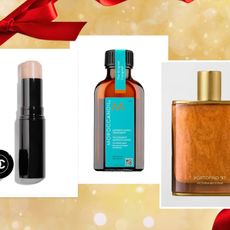 19 Beauty Stocking Stuffers Guaranteed to Please Your Pickiest Family Members
19 Beauty Stocking Stuffers Guaranteed to Please Your Pickiest Family MembersBeauty editor-tested and approved.
By Ariel Baker Published
-
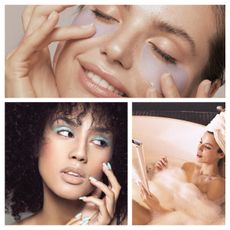 23 Luxury Beauty and Wellness Gifts for Your Pickiest Self-Care Obsessed Friends
23 Luxury Beauty and Wellness Gifts for Your Pickiest Self-Care Obsessed FriendsGuaranteed to please even your pickiest friends and family.
By Hannah Baxter Published
-
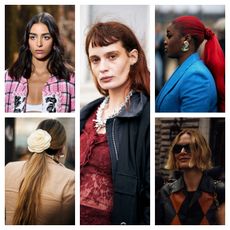 10 Winter Hair Color Trends Fashionable Women Love This Season
10 Winter Hair Color Trends Fashionable Women Love This SeasonThe season's top hair color trends are painfully chic.
By Jamie Wilson Published
-
 10 Winter Haircut Trends Stylish Women Are Wearing in 2024
10 Winter Haircut Trends Stylish Women Are Wearing in 2024It's time to get a little scissor happy.
By Jamie Wilson Published
-
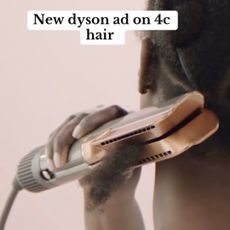 Why Dyson's New Airstrait Ad Ignited a TikTok Controversy
Why Dyson's New Airstrait Ad Ignited a TikTok Controversy"They said y'all can buy the product but it is not meant for you."
By Hanna Lustig Published
-
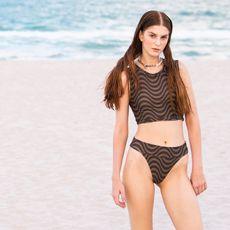 What Is Sugar Waxing? Everything to Know, According to Experts
What Is Sugar Waxing? Everything to Know, According to ExpertsIt's also less painful than some alternatives.
By Iman Balagam Published
-
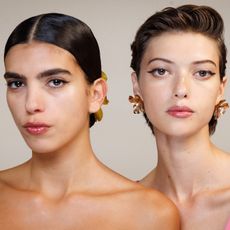 13 Best Drugstore Concealers That Feel Surprisingly Luxurious
13 Best Drugstore Concealers That Feel Surprisingly LuxuriousGreat things *do* come with small price tags.
By Iman Balagam Published
-
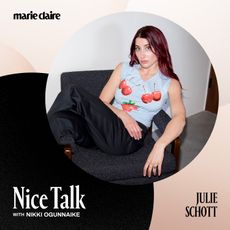 Starface Founder Julie Schott Shares Her Advice for Aspiring Entrepreneurs
Starface Founder Julie Schott Shares Her Advice for Aspiring EntrepreneursThe entrepreneur spoke to editor-in-chief Nikki Ogunnaike for the 'Marie Claire' podcast "Nice Talk."
By Sadie Bell Last updated